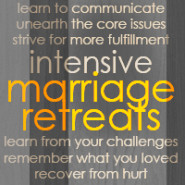
During the past 25 years, Dr. Mark Schwartz and Lori Galperin MSW, formerly of the Masters & Johnson’s Institute, have provided relationship therapy for hundreds of couples. Their extensive experience, across a broad array of issues, has taught them what is necessary for couples therapy and a marriage-saving, marriage retreat to be its most effective.
Marriage is a valuable asset. There are key reasons people marry and hope to stay married. From within a marriage, lives and careers are built, property and security is accumulated, children are created, and the deep desire for pair-bonding — the instinct we have for support, companionship, and love — is one of the greatest, life-enhancing benefits of all.
When a marriage begins to fall apart, so do all the stabilizing, nurturing forces in one’s life begin to fall apart. Before spending years unhappy and miserable for before taking that “no return” step through a divorce, consider if it’s worth saving. If even a tiny percentage of you says, “yes,” enroll the two of you in an Intensive Marriage Retreat immediately.
First, both partners must learn new ways of interacting. They must master skills for solving problems, listening, dealing with anger, frustration and passivity, and they must learn how to participate in quality interactions.
Second, they must practice these new ways of interacting until deep and authentic change takes place.
Third, they must be guided to examine the places where they are stuck or blocked that interfere with this change.
Rarely does once-a-week therapy allow for these three criteria to be met, regardless of how long over time the therapy continues. Momentum matters in therapy. The “right frequency” of sessions is critical to long-lasting success.
The solution, and one that has worked well, according to Schwartz and Galperin over the past 25 years, is the retreat model of initial intensive therapy conducted away from home, followed by at-home sessions as needed. The couple leaves home for seven days and undergoes an intensive, focused process.
Therapy sessions are three hours each day and then the couple is given the rest of the day to practice the skills and techniques discussed in session. This is a concentrated focus on healing the relationship and it is very effective as it removes the couple from work, children, countless responsibilities and other stressors.
What’s come to the forefront of marriage counseling is the implementation of a co-therapy team for each session. In this type of therapy, there are actually three clients to treat: the two partners and the relationship itself. Each partner learns new ways of interacting. Then the relationship itself — the special entity that the two partners create is treated as well in order to help it become a healthy, supportive force. This is a complicated process, with one therapist assigned to each partner individually and then the couple is united with the co-therapy team to work on the relationship itself. By doing this, strong therapeutic relationships are built between each therapist and their assigned individual, while avoiding the possibility of bias, in cases where one therapist working with both partners could result in one partner feeling the therapist is siding with the other.
It’s imperative to include in the retreat one or more longer sessions, for example a 90-minute session, to work on changing how the couples interact. And during a second and third extended session, Marriage Therapy Institute works with each individual intensively to remove blocks from their past that interfere with intimacy.
Nearly 30 years of study, including many years of training at the Masters & Johnson Institute have provided an unprecedented body of experience, research, and firsthand knowhow. This coupled with the critical inclusion of co-therapy collaboration when working with couples has led to innovations in couples work and dissolving marriage breakdown.
Now offering this time-tested marital retreat approach to their clients, Schwartz and Galperin have continued to witness restored passion, increased intensity, and love to relationships, all the components that had deteriorated due to neglect and misunderstanding.
After the retreat ends, couples should option to follow-up with a local therapist (for those from out of town) or with the Marriage Therapy Institute’s co-therapy team by Skype. Follow-up visits in place afterwards ensure that positive changes are maintained and daily stresses and misunderstandings do not damage the new foundation now built by partners during the retreat itself.
Recent Comments
MIT’s Marriage Retreats